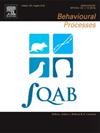The elusive nature of forward blocking effect on running-based taste aversion learning in laboratory rats
IF 1.3
4区 生物学
Q4 BEHAVIORAL SCIENCES
引用次数: 0
Abstract
It is well documented that rats learn to avoid a taste solution consumed immediately before voluntary running in activity wheels, which represents a form of Pavlovian aversive conditioning based on the taste-running association. Although various behavioral phenomena observed in typical Pavlovian preparations, such as fear conditioning, have also been demonstrated in this setup, evidence of the associative blocking effect is limited. The present study aimed to demonstrate this effect, and the first experiment provided some positive evidence. Conditioning rats with serial presentations of two taste solutions followed by an opportunity to run (A → B → running) resulted in reduced aversion to taste A if the rats had prior experience of running after consuming B (B → running), suggesting that the previously established B-running association blocked the A-running association. However, subsequent experiments failed to yield statistically reliable results, raising questions about the robustness of the blocking effect on running-based taste aversion learning.
实验大鼠以奔跑为基础的味觉厌恶学习的前向阻断效应的难以捉摸性。
有充分的证据表明,老鼠学会避免在自愿跑步之前立即食用的味道溶液,这代表了一种基于味觉-跑步关联的巴甫洛夫厌恶条件反射。虽然在典型的巴甫洛夫准备中观察到的各种行为现象,如恐惧条件反射,也在这种设置中得到了证明,但联想阻断效应的证据是有限的。本研究旨在证明这一效应,第一个实验提供了一些积极的证据。对连续呈现两种味道的大鼠进行条件反射(A→B→跑步),如果大鼠在食用B (B→跑步)后有跑步的经验,则大鼠对A味道的厌恶程度降低,这表明先前建立的B-跑步关联阻碍了A-跑步关联。然而,随后的实验未能产生统计上可靠的结果,这就提出了关于阻塞效应在基于跑步的味觉厌恶学习中的稳健性的问题。
本文章由计算机程序翻译,如有差异,请以英文原文为准。
求助全文
约1分钟内获得全文
求助全文
来源期刊

Behavioural Processes
生物-动物学
CiteScore
2.70
自引率
7.70%
发文量
144
审稿时长
4-8 weeks
期刊介绍:
Behavioural Processes is dedicated to the publication of high-quality original research on animal behaviour from any theoretical perspective. It welcomes contributions that consider animal behaviour from behavioural analytic, cognitive, ethological, ecological and evolutionary points of view. This list is not intended to be exhaustive, and papers that integrate theory and methodology across disciplines are particularly welcome.
 求助内容:
求助内容: 应助结果提醒方式:
应助结果提醒方式:


